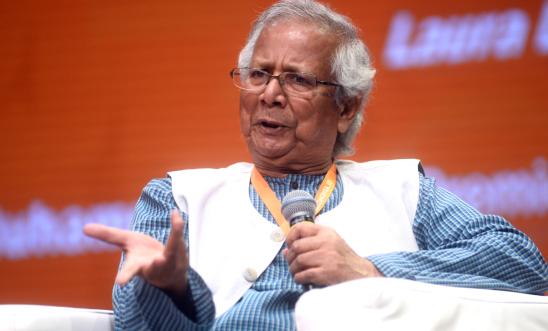
Press releases
Bangladesh: Authorities must end 'relentless smear campaign' of Nobel laureate

Authorities weaponising labour laws to harass and intimidate Nobel Peace laureate Mohammad Yunus
More than 150 cases lodged against 83-year-old Nobel laureate
‘The abuse of laws and misuse of the justice system to settle vendettas is inconsistent and incompatible with international human rights treaties’ – Agnès Callamard
Authorities in Bangladesh must stop weaponising labour laws and immediately end their harassment and intimidation of the Nobel Peace laureate Mohammad Yunus, Amnesty International said today.
Mohammad Yunus, who is also the chairman of the board at Grameen Telecom, is accused of employment-related violations and faces a criminal case in Bangladesh under the Labour Act 2006. Three other board members, Ashraful Hasan, Nur Jahan Begum and Mohammad Shahjahan, face the same charges.
The ongoing trial is just one of more than 150 cases filed against Mohammad Yunus after the ruling Awami League party came into power in 2008. Amnesty believes that initiating criminal proceedings against Mohammad Yunus and his colleagues for issues that belong to the civil and administrative arena is a blatant abuse of labour laws and the justice system and a form of political retaliation for his work and dissent.
Agnès Callamard, Secretary General of Amnesty International, said:
“Mohammad Yunus’s case is emblematic of the beleaguered state of human rights in Bangladesh, where the authorities have eroded freedoms and bulldozed critics into submission.
“The Bangladesh government’s relentless smear campaign against Mohammad Yunus shows the desperate lengths the current regime is willing to go to set an example through the hounding of an 83-year-old Nobel laureate.
“The abuse of laws and misuse of the justice system to settle vendettas is inconsistent and incompatible with international human rights treaties.
“Rather than misusing labour laws and criminal justice to harass Mohammad Yunus, the authorities should focus on combatting extensive threats to labour rights such as unsafe factories which continue to claim the lives of thousands of workers in Bangladesh.
“It is time for the Government to put an end to this travesty of justice.”
PM attacks on Yunus
Prime Minister Sheikh Hasina has publicly attacked Yunus on many occasions. In 2011, she accused him of “sucking blood from the poor” and in 2022 she suggested he should be dropped in the river Padma for “trying to block the funding” of the Padma bridge project. Most recently she said “many Nobel laureates are now in prison” and that “the law will take its course” suggesting that Yunus could also be imprisoned.
Labour rights court cases
The unusual speed in which the trial against Yunus is proceeding stands in stark contrast with other labour rights-related court cases in Bangladesh. This includes the fires at the BM Container Depot in 2022 and the Hashem Foods Factory in 2021 where almost 100 factory workers were killed due to the employer’s alleged negligence and non-compliance with safety standards. In both cases, the company owners faced no known criminal liability and evaded accountability by paying paltry compensations. Occupational safety of workers remains a distant prospect with conservative estimates from the Safety and Rights Society, an NGO working to improve working conditions in Bangladesh, recording more than 4,700 worker deaths between 2013 and 2022.
The company Grameen Telecom is not named as a party in the case and only the three directors who are most closely associated with him are mentioned, which suggests that the case is politically motivated and targeted at harassing and intimidating Yunus. None of the accused directors were actively engaged in controlling the daily activities of the company.
Nobel Peace Prize
In 2006, Mohammad Yunus and Grameen Bank were awarded the Nobel Peace Prize for their work to “create economic and social development from below”. In 1994, he established the Grameen Telecom to extend information technology to rural populations in Bangladesh.
On 5 September, the United Nations High Commissioner for Human Rights issued a statement expressing concern about the harassment and intimidation of Yunus and other dissenting voices in Bangladesh.